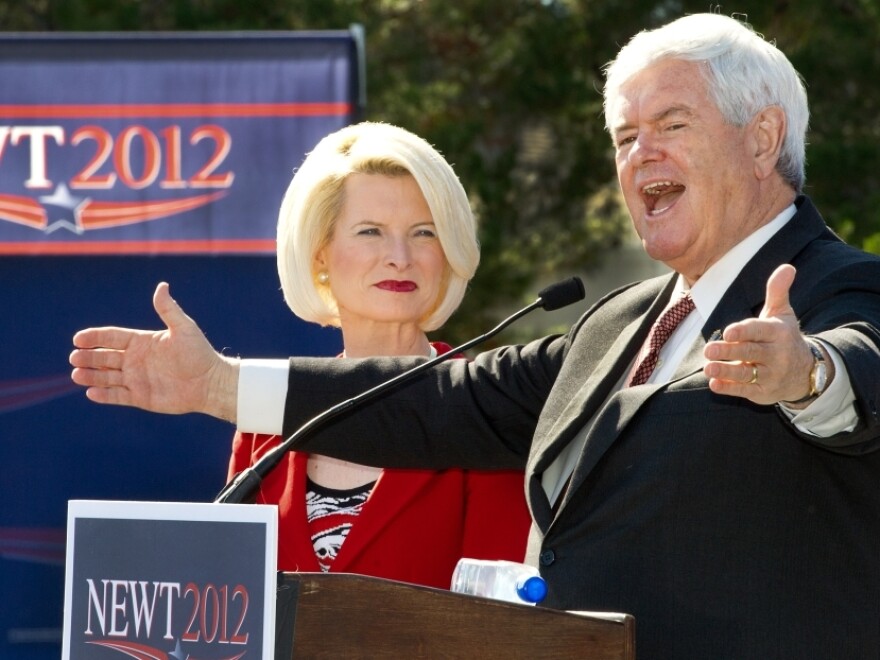At a campaign event in Jacksonville, Fla., Monday morning, Newt Gingrich dropped a name that he has been using a lot lately.
"I believe in the Constitution; I believe in the Federalist Papers. Obama believes in Saul Alinsky and secular European socialist bureaucracy," Gingrich said.
In Saul Alinsky? Who is this Alinsky guy and why does Gingrich seem to mention him every chance he gets?
I believe in the Constitution, I believe in the Federalist Papers. Obama believes in Saul Alinsky and secular European socialist bureaucracy.
Here's the connection Gingrich wants you to make: President Obama proudly talks about his days as a community organizer in Chicago, and the late Chicagoan Alinsky "wrote the book" on community organizing. Two books actually. The most famous is Rules for Radicals, published in 1971. But despite that title, there was really nothing terribly ideological about Alinsky, says his biographer, Sanford Horwitt.
"He wanted to see especially lower-income people who were getting pushed around to exercise some influence and even power over decisions that affected their lives," Horwitt says.
Alinsky began that work in the 1930s and kept at it until his death 40 years ago. In an interview with the late Studs Terkel, Alinsky said he was much more concerned with the "how" of politics than the "what." He explained this by way of an imaginary conversation with the ancient Greek Oracle at Delphi, whose advice in this story was "know thyself."
"A smart organizer would look at her and say, 'OK, Oracle, how the hell do I go about doing it?' " Alinksy said. " 'Don't tell me what I have to get; tell me how to get it, because unless I know the 'how,' the 'what' is just rhetoric.' You know?"
Still, plenty of people, predominantly on the right, view Alinsky as an ideologue. You can find him described as a Marxist on some conservative websites, although Horwitt says Alinsky had an aversion to Communists.

"Part of his turnoff was the rigid ideology and really the lack of humor that he saw in almost all the Communists that he even got to know briefly," Horwitt says.
Humor — of a sort — or at least theatrics, played a big role in Alinsky's organizing technique, according to the Rev. Leon Finney. Finney started his career as an organizer in the Woodlawn Organization, a Chicago group that Alinsky helped found in the early 1960s. There were a lot of slums in Woodlawn, says Finney, and their organization had gotten no help from the city, the courts or the landlords.
"So Saul's idea was we're going to get some of our black Negro people to drive to the suburbs where the property owners live and we're going to go door to door and we'll say to the neighbors, 'Will you call "Joe Adams" and tell him to fix up his buildings?' " Finney recalls.
This tactic is still used today, and sometimes by conservatives. Opponents of abortion rights, for example, have picketed the homes of abortion providers. Over time, the Woodlawn Organization has grown and prospered; now it is under investigation because of allegations it has played fast and loose with government grant money. Finney has denied personally profiting from his work with the group. But back in the1960s, picketing the slumlord's home worked, he says, by pushing the neighbors of the fictitiously named Adams to take action when no one else would.
They know that he represents a liberal viewpoint and from the context of Gingrich's remarks, they know that he's someone to disapprove of.
"His neighbors didn't really care about the blacks that were marching around," Finney says. "They didn't want those blacks in their neighborhood doing anything. And so they would call Joe Adams up and say, 'Look, we don't care what you gotta do. You get those "blankety-blanks" out of our neighborhood.' "
This is a classic Alinsky principle, says Finney. Take a negative, such as the neighbors' racism, and turn it into a positive for your own cause. But Dan Schnur, a political analyst at the University of Southern California, says when Gingrich mentions Alinsky's name, his audience doesn't know these details and doesn't particularly care.
"They know that he represents a liberal viewpoint and from the context of Gingrich's remarks, they know that he's someone to disapprove of," Schnur says. Schnur says Gingrich has two goals in mind when he brings up Alinsky.
"Not only does he get to link Obama to a noted liberal activist," Schnur says. "But he gets to remind voters of what Gingrich considers to be one of his own greatest strengths — his intellectual firepower."
But in a debate in Florida last week, Gingrich's claim to be the "big ideas" candidate was belittled as "grandiose" by rival Rick Santorum. Gingrich embraced the criticism.
"I accept the charge that I am an American and Americans are instinctively grandiose because we believe in a bigger future," Gingrich said in the debate, to cheers from the audience.
So, Gingrich took Santorum's attack and turned it into something positive for himself — a page right out of the Saul Alinsky playbook.
Copyright 2021 NPR. To see more, visit https://www.npr.org.




